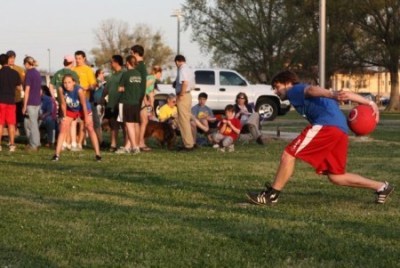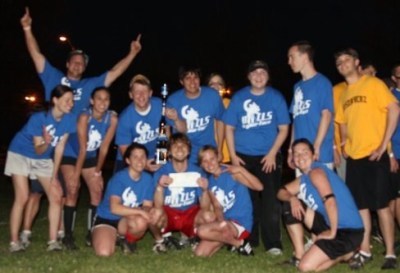By Claire McPhee
Class of 2012
North Carolina State University
Prior to veterinary school, exercise was a vital component of my life. In college I became very involved in racing bicycles and triathlon training, and even during graduate school, I had flexibility in my schedule to run and ride my bike on a daily basis. For years, I had become accustomed to a high level of physical activity and exercise. And then came veterinary school…
This is professional school, and beginning from day one, we become professional…sitters! Veterinary students spend between 5 and 8 hours per day spent glued to a seat while information is pummeled into our heads. On breaks between classes, we peruse the bake sale table, where our clubs raise money for activities by peddling sugary snacks. Our reward for finishing each day at school is to go home exhausted, and sit all night, reviewing and memorizing what we’ve been taught. In addition to the stress of the material we have to learn, for the active among us, the stress of sitting still for the entire day is definitely an additional burden.
But fear not—this tale of woe has a happy ending! Now at the end of my third year of veterinary school, and heading into clinics (where ironically, I will be lucky if I am able to sit down for 20 minutes a day to eat lunch) I will no longer spend the better part of my day warming a chair. However, I have also found ways to successfully make exercise (even marathon training!) work with veterinary school, and offer a few tips that might help get you off the couch, or away from your desk.
1. By taking the time away from studying, you will have better focus and absorb more information when you are actually studying. In the words of my austere 9th grade health teacher, “When you’re tired, don’t take a nap! Go for a jog!” While I never would have admitted it at the time, it’s possible that Mr. Sabers was on to something. I challenge you to see whether exercise can help to clear your head after a day at school and refresh you for a productive evening of focus.
2. Your pets will be better behaved and love you for it. Vet school is hard on them too, and walking/running will provide good bonding as well as getting out some of their pent up energy (and yours too!)
3. Set reasonable goals. If you are a goal-oriented person, try signing up for an activity, like a short triathlon or a 5k road race. Then put a plan in place to achieve that goal and stick to it. Working towards a goal is an excellent way to stay on track with training.
4. You can still learn. If the test is tomorrow or you aren’t willing to give up study time, that’s okay. Try recording lectures and putting them on an mp3 player to listen while you move. Most laptops have built in audio recording software (On a Mac, try the “notebook” view in Microsoft Word – you can then export the audio). You could listen to lectures in “audiobook” setting on an iPod, which enables you to choose a slightly faster playback speed. Even if you don’t pay attention to every word, you might still get a lot out of re-listening to lectures out of the class mentality. When you get home, try to write down what you remember as the most important things from the lecture, and maybe glance through the presentation slides while it is still fresh in your mind. If you’re really not paying attention to a lecture, try switching to music for a while.
5. Exercise can improve your sleep patterns, so you can get the most out of class tomorrow. Disclaimer: if you aren’t sleeping enough, your body may not get a tremendous benefit from a workout. Exercise should be combined with a reasonable amount of sleep (number of hours differs for everyone).
6. Make healthy habits now. Veterinary school may not be the busiest time of your life. In the future a job, plus family, pets, yard work, meal preparation and more will make you look back at these years and *sigh.* The sooner you start prioritizing your health, the more likely that you will be able to do so in the future.
7. If running or walking are not your thing, look into joining a community or university sports league. A weekly game of softball or soccer might be just the thing to take your mind off the canine gastrocnemius muscles and help develop your own gastrocnemius. Additionally – intramurals or community sports are a great way to meet people who are not in veterinary school. This will help you remember that there is a world outside our vet school bubble and that interacting in that world can be fun!
As veterinary students, we sacrifice so much to achieve our professional goals—but are those goals worth sacrificing our health and well-being? The American Heart Association recently published an article based on a review 74 studies on physical activity and other factors to determine which strategies were effective for reaching goals and staying healthy. The studies indicate that a healthy lifestyle increases the average American life expectancy by nearly 7 years.[1] Think of that as 7 more years to enjoy life after you have finally paid off student loans! So go ahead, give yourself permission to find out if regular exercise can make you a more efficient and healthier vet student.
[1] Artinian, N. T. et al., Interventions to promote physical activity and dietary lifestyle changes for cardiovascular risk factor reduction in adults: a scientific statement from the American Heart Association. Circulation 122(4):406-441.
 Sunday, June 12, 2011 at 08:13PM
Sunday, June 12, 2011 at 08:13PM  Health and Fitness,
Health and Fitness,  Texas A&M in
Texas A&M in  Life as a Vet Student
Life as a Vet Student 

